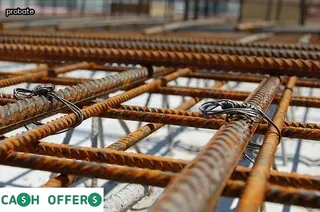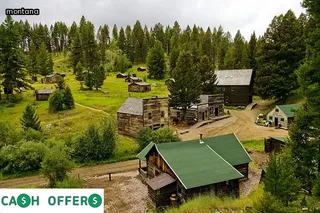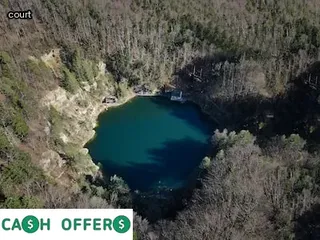When purchasing real estate in Montana, it is important to know the state's probate process. Probate is the legal process of transferring a deceased person's assets and property after their death.
In Montana, the process begins with filing a petition with the court. This is followed by notifying all interested parties and giving them an opportunity to respond.
The executor of the estate then collects any debts owed by the deceased, pays any taxes due, and distributes any remaining assets according to the deceased's will or state law in cases where no will exists. Along with this process, there are certain deadlines that must be met, such as filing within four months of receiving notice of appointment as executor or administrator.
Additionally, creditors must be notified within three months of appointment or they may lose their right to collect on any debts owed to them by the decedent. Understanding these steps and deadlines can help ensure a smooth transition of ownership when buying real estate in Montana.

Establishing an executor of estate in Montana is an important step when it comes to real estate and probate. Knowing the legalities involved with selecting an executor of a will is essential in making sure the process runs as smoothly as possible.
Before deciding who to appoint, it is important to understand the laws governing the selection of an executor within Montana. The person chosen should have a good knowledge of the person's assets and debts, as well as any specific instructions that are included in the will or trust.
Furthermore, Montana law dictates that only certain people may be named as executors - typically those who are over 18 years old and otherwise qualified by law. Additionally, some states also require that a bond be posted for any appointed executor in order to ensure they will act according to their fiduciary duty.
In order to avoid potential conflicts down the line, it is important to discuss all of these elements with your estate planning attorney prior to making any decisions about who should serve as your executor. Real estate and probate can be complicated matters, so make sure you take all necessary steps before buying a house in Montana.
In Montana, executors of an estate are typically compensated for their services. To determine who is eligible to receive such compensation, it is important to understand the probate laws in the state.
Under Montana law, any person named as an executor in a will or appointed by the court to act as an executor is eligible to receive compensation. An executor may also be eligible if they are related to the deceased and have acted diligently in managing the estate's assets.
The amount of compensation paid out depends on several factors including how much time and effort was put into administering the estate, the complexity of the estate, and the value of the property involved. Additionally, when real estate is part of a probate case, additional considerations must be taken into account such as whether there are liens on it or not.
In some cases, a court may decide that an executor should not receive any compensation at all. Ultimately, it is important for anyone buying a house in Montana to understand these rules relating to real estate and probate so that they know who can be compensated as an executor when making a purchase.

When considering real estate in Montana, it is important to understand the probate process and how it impacts buying a house. While probate can be a lengthy and costly process, there are alternatives available to settle an estate in Montana.
One alternative is joint tenancy with right of survivorship. This type of ownership allows two or more people to own property together and when one owner dies, the other owners automatically inherit the deceased person’s share without having to go through probate court.
Another option is transferring assets into a living trust. A living trust allows for assets to bypass probate court and be transferred directly to the beneficiary upon death of the grantor.
Finally, gifting real estate can help avoid probate as well. Gifting real estate before death allows for direct transfer of ownership from the owner to another person without going through a court process.
Understanding these options is essential when purchasing property in Montana so that buyers can make informed decisions about their real estate transaction.
When it comes to real estate in Montana, avoiding probate can be both beneficial and challenging. On the plus side, probate is a costly process, and by sidestepping it, a person can save money on court fees and legal costs associated with the settlement of an estate.
In addition, avoiding probate in Montana often means quicker transfer of ownership after a death occurs. On the downside, there are some drawbacks that come with forgoing the probate process.
If a person does not have a will or trust set up prior to their death, it can be difficult to determine who should receive property from an estate without going through the courts. Furthermore, if certain assets are not correctly titled prior to death or do not have designated beneficiaries, they may have to go through probate in order for them to be distributed properly.
Ultimately, when buying real estate in Montana, it is important for individuals to understand all their options so that they can make informed decisions about how best to transfer property after their death.

When it comes to buying a house in Montana, it is important to understand the probate process and how it affects estate planning. Estate planning involves creating a comprehensive plan that minimizes the need for probate.
Probate is the legal process of recognizing and validating a will or settling an estate after someone has passed away, and can be a lengthy and costly process. To reduce the likelihood of probate, individuals should consider creating several documents such as a will, trust agreement, medical directives, durable power of attorney and other related documents that outline their wishes for themselves and their assets after death.
Additionally, proper asset titling can also help avoid probate by ensuring assets are transferred directly to beneficiaries upon death instead of going through the court system. Taking steps to create an estate plan now can save time and money later on when real estate in Montana needs to be bought or sold.
In Montana, probate is the process of legally transferring possession of a deceased person’s assets to their chosen heirs or beneficiaries. Any real estate owned by the deceased must go through probate in order to be legally transferred.
Other types of property that must go through probate include tangible personal property such as vehicles, jewelry, and furniture; intangible personal property such as stocks and bonds; bank accounts; and any other assets held solely in the name of the deceased. It is important to note that some assets may pass outside of probate if they are jointly owned or have designated beneficiaries, such as life insurance policies.
Before buying a house in Montana, it is important to make sure that all assets associated with the purchase have been properly transferred through probate proceedings.

The probate process can be a lengthy one and the amount of time it takes to complete the process of probating a will in Montana can vary depending on the size and complexity of an estate. Generally, the timeline for probate is between 6-12 months, but if there are complications or disputes, this timeline could be extended.
It is important to factor in this additional time when considering the purchase of real estate in Montana as part of an estate. If you are buying real estate that is part of an estate, it would be wise to inquire about when the probate process is expected to be completed before making your purchase decision.
During the probate process, all debts and taxes must be paid off and it must be determined who would receive which assets from the will. To ensure accuracy, all paperwork needs to be thoroughly reviewed and any necessary court hearings need to attend before a judge can sign off on the final decree of distribution.
There are also certain filings that must take place with regards to publishing a notice about the will in local papers and submitting final documents with state agencies. All these steps require patience and due diligence from all parties involved in order for the probate process to move forward efficiently.
In Montana, the probate process must be initiated within four months of a person's death. The executor of the estate is responsible for filing a petition with the court to open an estate and begin probate proceedings.
Additionally, there are deadlines for filing other documents such as inventories and accountings during the course of the probate process. It is important to be aware of these deadlines in order to avoid any potential delays or problems which may arise if they are not met.
Failure to comply with certain timelines can result in additional costs or even invalidation of certain actions taken by the executor or administrator of an estate. Therefore, it is vital that anyone considering buying real estate in Montana understands these deadlines and takes steps to ensure they stay on track throughout the entire probate process.

The Probate Court plays an essential role in settling an estate when real estate is involved in Montana. The court oversees the entire process of transferring ownership of property after a person’s death, including verifying the validity of the will, appointing an executor or administrator to manage the deceased's assets, and ensuring that all debts and taxes are paid before distributing any remaining assets to heirs.
This also includes overseeing the sale or transfer of real estate owned by the deceased. Depending on whether it is a probated will or not, different steps may be taken in order to settle an estate.
If there is a valid will, the Probate Court follows its instructions for settling the estate; if there is no will, then it follows state law for distributing assets and property. The Probate Court also has authority over matters related to real estate disputes such as guardianship issues and power-of-attorney appointments.
It is important for anyone looking to purchase a home in Montana to understand these processes and how they can affect their buying experience.
Navigating the Rules and Regulations of the Montana State Probate Code can be a complex process for those unfamiliar with real estate law. Knowing what is required when purchasing a house from an estate in Montana is essential to avoiding potential legal issues down the road.
It's important to understand that all probate property must go through the court system, and there are specific rules regarding who can file for probate and how long it takes to complete. When buying real estate from an estate, it's also necessary to understand how inheritance taxes work and which exemptions may apply.
Lastly, buyers should be aware of the disclosure requirements in Montana that provide protections against potential liabilities associated with purchasing a deceased person’s home. Taking the time to properly research these matters before buying a home in Montana will help ensure that all parties involved are protected under state law.

Buying real estate in Montana can be an exciting and rewarding experience, but it's important to understand the legalities involved before you take the plunge. One of those is probate, which can be a tricky issue when it comes to buying a house.
Fortunately, in many cases probate isn't necessary when buying real estate in Montana. In particular, if you're dealing with a small estate or transferring ownership from one family member to another, there may not be any need for probate proceedings.
However, it's always wise to consult with an experienced attorney before signing any documents so you know your rights and obligations as a buyer. Furthermore, in some cases probate may still be required even if there are no large assets associated with the property, such as if there are still outstanding debts or taxes owed on the property.
Knowing what steps need to be taken beforehand will ensure that your purchase process goes smoothly and without any surprises down the line.
Estate planning is an important part of the real estate process in Montana. Depending on the type of property being purchased, different forms of wills, trusts and powers of attorney may need to be established.
A will is a legal document that outlines how a person's assets should be divided upon their death. Trusts are a form of legal arrangement that allows for assets to be managed by a third party for the benefit of another person.
Powers of attorney are documents that allow someone else to make decisions about someone's finances or medical care if they become incapacitated. Knowing which forms are necessary and when they should be used is essential before committing to buying any real estate in Montana.
It's important to consult with an experienced lawyer or financial advisor who can help create an estate plan tailored to specific needs and circumstances.

Dealing with the probate process after a loved one passes away can be a difficult and time consuming process. It is important to understand the laws in Montana regarding real estate and probate so your family doesn't have to deal with any unexpected difficulties.
Knowing what steps you need to take before buying a house in Montana can help ensure that your loved ones don’t face any issues during the probate process. Before purchasing, it is important to understand how title transfers are handled when someone dies and how you will access the property if it’s not part of a living trust.
Furthermore, you should research whether or not there is a lien on the property and whether or not there are any outstanding debts that will need to be paid out of the estate. By understanding all of these factors beforehand, you can rest assured that your loved ones won't have to go through any unexpected difficulties during probate.
Real estate can complicate the probate process in Montana due to the state's unique inheritance laws and regulations. Probate is a legal procedure that takes place after a person passes away, where assets are divided according to their will or through intestacy if there is no will.
In Montana, courts must approve all real estate transactions upon the death of an owner. The state requires a formal appraisal of the property as well as proof that heirs are entitled to receive their inheritance before they can take ownership.
This can create significant delays in settling an estate, which can be costly for those involved. Additionally, depending on the size of the estate, a complex network of wills and trusts may need to be established in order to ensure proper distribution of assets.
Understanding these complexities and preparing for them in advance is essential for anyone considering buying real estate in Montana after someone has passed away.
Yes, in Montana, an estate must go through probate before a house can be bought. Probate is the legal process of transferring ownership of assets from a deceased person to their rightful heirs or beneficiaries.
In Montana, probate involves filing appropriate paperwork with the court and gathering necessary documentation related to the property. After the court approves the transfer, it will issue an order transferring title of the home to the designated heirs or beneficiaries.
For real estate transactions involving an estate, it is important to understand the laws governing probate in your state so that you know what steps are necessary to ensure a smooth transition of ownership.

In Montana, a will must be probated in order for its terms to be valid. Probate is the process of proving in court that a will is valid and properly executed, and it involves identifying and inventorying the assets of a deceased person, paying debts and taxes, and distributing the estate according to the terms of the will.
In order to open probate proceedings in Montana, you must file an application with the district court in the county where the deceased person lived at death or owned real property. Once you have filed this application, you will then be appointed as personal representative of the estate by the court.
As personal representative, it is your responsibility to ensure that all assets are accounted for and distributed according to state law. When purchasing a house in Montana, it is important to understand these laws so that you can make an informed decision about whether or not to pursue probate before closing on any real estate transaction.
In the state of Montana, there are two types of probate that can occur when a person passes away and leaves behind real estate: formal and informal probate. Formal probate is a court-supervised process in which the decedent's assets are identified and distributed to heirs according to the terms of his or her will.
Informal probate is an administrative process where an executor is appointed by the court to take care of the assets without court supervision. Both types of probate have specific requirements that must be met in order for it to be successful, so it's important to understand the differences between them before buying a house in Montana.
In informal probate, creditors must be notified of the estate, all taxes must be paid, and any debts or liabilities must be settled before any property can be distributed. On the other hand, in formal probate, a court hearing is held where creditors may present claims against the estate and all parties involved must agree on how assets should be divided among heirs.
Whether you're purchasing real estate through formal or informal probate in Montana, it's essential to have a clear understanding of your rights and responsibilities as a buyer so that you can make an informed decision about your purchase.
In Montana, the probate threshold is set by the state and is based on the total value of assets held by the decedent. The current probate threshold in Montana is $35,000 or less.
This means that if a deceased individual had assets valued at $35,000 or less when they passed away, their estate does not need to go through formal probate proceedings; instead, there will usually be an informal process for distributing the assets among beneficiaries. Real estate that is held alone or with other assets may exceed this threshold amount, so it's important to understand how real estate and probate interact in Montana before buying a house.
It's also important to consider any additional costs associated with probating a home as part of your purchase decision.